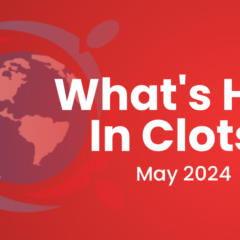Last updated on
What’s Hot in Clots – April 2023
Key Updates in Thrombosis
Table of Contents
At the beginning of the spring, the Persian New Year is celebrated, and I’d like to share Season’s Greetings. Here we go with the studies for this month:
Anticoagulation in COVID-19: Getting closer to FREEDOM from uncertainty
The FREEDOM COVID trial was presented at the 2023 American College of Cardiology Scientific Sessions and simultaneously published in JACC. FREEDOM was the largest anticoagulation trial in hospitalized patients with COVID-19. Although it failed to show a benefit for the primary composite outcome, reductions were observed in all-cause mortality and intubation, consistent with some prior randomized trials. In an upcoming editorial, Dr. Vaduganathan and yours truly share some thoughts. Read more.
Heterogeneity of treatment effect for anticoagulation in COVID-19
Checking the consistency of treatment effect within subgroups is a common practice in clinical trials, but here the multiplatform trial investigators go one step further – they checked the heterogeneity of treatment effect via a risk-based approach (using a risk score), and an effect-based approach (to assess effect modification by the predicted effect). The third method is one that I am still trying to comprehend…
What were the key messages? In short, several of the analyses suggested effect modification. Higher body mass index and higher baseline risk (especially use of cardiorespiratory organ support) were suggestive of no benefit (or deriving harm) from full-intensity anticoagulation. Read more.
Old frail patients with NSTEMI: Less is more
A randomized trial of 167 older adults aged ≥70 years with a Clinical Frailty Scale score ≥4 showed that days alive out of the hospital were not significantly different between patients randomized to conservative management vs those randomized to routine invasive strategy (angiography). In fact, the findings were non-significantly favorable for conservative management, both for days alive out of the hospital, and for overall survival. Read more.
Machine learning to predict bleeding: A step forward, but a long road ahead
In this study based on the RIETE registry, machine learning models (particularly XGboost) outperformed existing risk scores, such as VTE-bleed, for prediction of major bleeding events. That said, the sensitivity was markedly dropped in the external validation dataset (COMMAND-VTE). This was in part because several predictor variables of the machine learning model were unavailable in COMMAND-VTE. An ideal future prediction model should have a high positive predictive value, without compromising on sensitivity. Read more.
Enjoy this update? Be sure to subscribe to get the latest updates each month.

Behnood Bikdeli, MD, MS
Cardiologist, Section of Vascular Medicine, Division of Cardiovascular Medicine, Brigham and Women’s Hospital
Investigator, Thrombosis Research Group, Division of Cardiovascular Medicine, Brigham and Women’s Hospital
Instructor, Harvard Medical School
Investigator, Yale/ YNHH Center for Outcomes Research and Evaluation, Yale School of Medicine
Investigator, Cardiovascular Research Foundation



